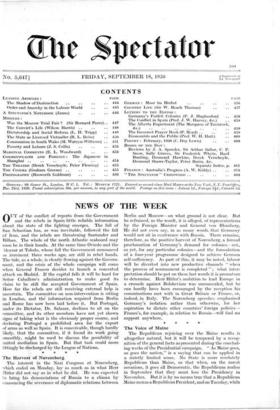The Harvest of Nuremberg The interest in the Nazi Congress
at Nuremberg, which ended on Monday, lay as much as in what Herr Hitler did not say as in what he did. He was expected to bring his denunciations of Russia to a climax by announcing the severance of diplomatic relations between Berlin and Moscow—on what ground is not clear. But he refrained, as the result, it is alleged, of representations by the Foreign Minister and General von Blomberg. He did not even say, in as many words, that Germany would not sit in conference with Russia. There remains, therefore, as the positive harvest of Nuremberg, a formal proclamation of Germany's demand for colonies—not, as yet, for any particular colonies—and the formulation of a four-year programme designed to achieve German self-sufficiency. As part of this, it may be noted, labour will be diverted into new productive channels " when the process of rearmament is completed " ; what inter- pretation should be put on these last words it is premature to determine. Herr Hitler's ambition to lead Europe in a crusade against Bolshevism was unconcealed, but he can hardly have been encouraged by the reception his comminations met with in Great Britain or France, or, indeed, in Italy. The Nuremberg speeches emphasised Germany's isolation rather than otherwise, for her aspiration to dictate other countries' foreign policies— France's, for example, in relation to Russia—will find no support anywhere.










































